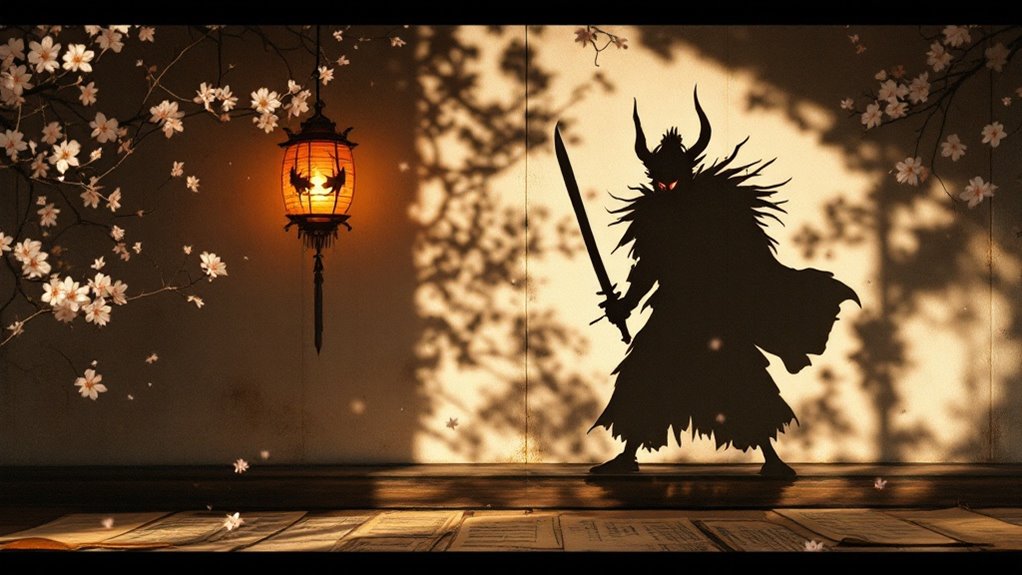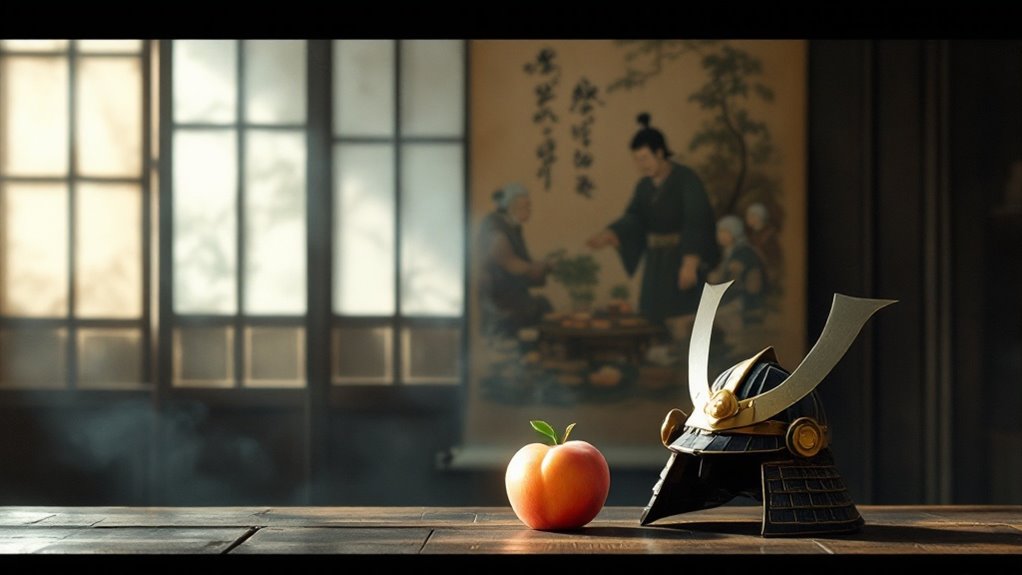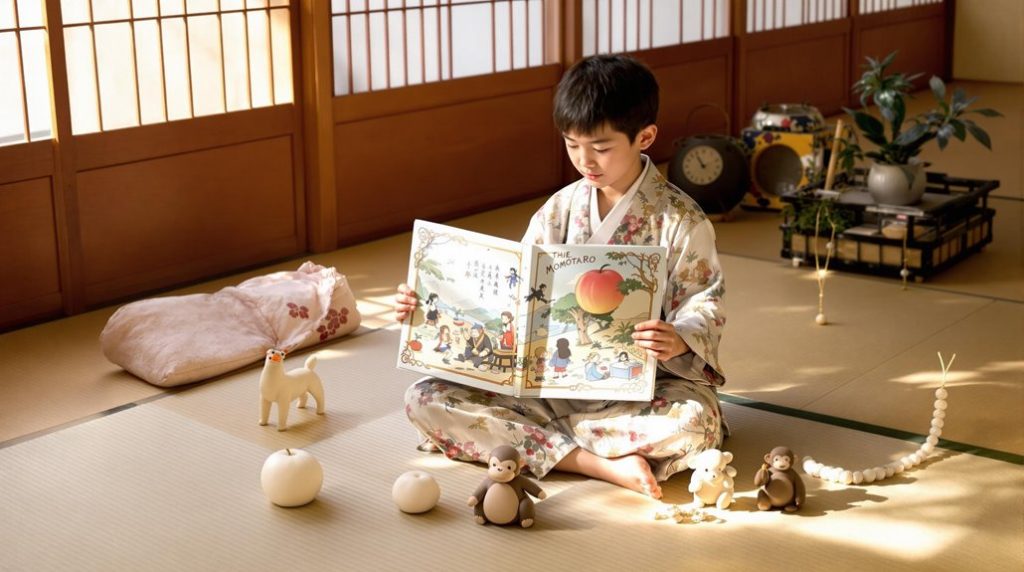The tale of Momotaro offers a powerful reflection of our shared human journey towards wisdom and moral development.
From the moment this legendary hero emerges into the world, his path parallels our own eternal struggle between right and wrong, bravery and fear. As we follow his transformation from humble beginnings to celebrated warrior, we witness the universal themes that shape not only Japanese folklore but our collective understanding of heroism and virtue.
Through his unlikely friendships with animal companions and his battle against the menacing oni, Momotaro's story reveals fundamental truths about the strength of unity, the importance of perseverance, and the enduring power of the human spirit. Let's examine the insights this timeless legend provides into our own capacity for growth and change.
The Hero's Noble Journey
One of Japan's most enduring tales of heroic transformation begins with a miraculous birth from a giant peach during the Edo period. What strikes me most about Momotaro's journey is how closely it follows the classic hero's path – rising from humble beginnings to confront evil and inspire countless generations. The tale originates from written Edo records and has remained largely unchanged through time.
Like all great mythic heroes, Momotaro faces pivotal choices that test his noble spirit. I find it fascinating how he builds his team through simple acts of kindness, sharing dumplings with a dog, monkey, and pheasant who become his loyal companions. Through his unwavering determination and leadership, he confronts the demons plaguing his land. His triumphant return home with treasure and freed captives represents more than victory – it symbolizes the transformative power of courage, integrity, and justice.
Unity Through Shared Purpose
Exploring Japan's Cultural icons: Momotaro and the Power of Unity. The heroic tale features millet dumplings that unite Momotaro with his loyal animal companions.
Facing The Darkness Within

Momotaro's confrontation with the ogres represents humanity's eternal struggle with inner darkness and personal demons. I believe the true power of this tale lies in how the external battles mirror our own internal conflicts – those shadows we must all face to grow stronger.
The boy's journey teaches us that real victory isn't just about conquering external foes; it's about mastering our fears, doubts, and weaknesses. When Momotaro faces the ogres, he's really confronting the darkness within himself, just as we must confront our own. His allies – the dog, monkey, and pheasant – symbolize the different aspects of our personality and strengths we need to integrate to become whole. Through this heroic quest, I've learned that facing our inner demons isn't just necessary – it's transformative. Upon his triumphant return, the proud village celebration shows how personal victories can inspire and uplift entire communities.
Triumph Over Life's Challenges
Overcoming life's challenges often requires us to face our deepest fears, build alliances, and transform adversity into strength. As I reflect on the tale of Momotaro, I'm reminded of the power of determination and courage in triumphing over the obstacles we encounter.
- Challenges and Paths to Triumph:
- Fear: Confront it head-on with unwavering bravery
- Isolation: Surround yourself with diverse, supportive people
- Adversity: Turn your struggles into sources of resilience
- Doubt: Have faith in your unique abilities
- Opposition: Stand your ground and fight for what you believe in
Like Momotaro, we can't achieve victory alone. By uniting with those who complement our strengths, we can break through seemingly impossible barriers. When we approach life's journey with moral courage and collaborate with others who share our vision, every challenge becomes a stepping stone towards our ultimate success.
Legacy Of Japanese Values

Three enduring pillars of Japanese culture stand out in the legend of Momotara: our spiritual connection, collective harmony, and moral courage. To me, Momotara's birth from a peach symbolizes nature's power to bring forth the extraordinary. When he shares his kibi dango with the animals, he teaches us that unity and cooperation are the keys to strength, not pursuing glory alone. Through countless retellings over the centuries, from ancient Shinto teachings to modern adaptations, I've seen this story evolve while keeping its core intact. It endures because it speaks to our deepest desires for growth and human connection.
Frequently Asked Questions
Why Did Momotaro Share Kibi Dango Instead of Other Traditional Japanese Foods?
Momotaro picked kibi dango for a reason – these sticky rice dumplings symbolized an unbreakable bond of trust and loyalty. Sharing them with his animal companions forged a sacred alliance that would last a lifetime.
How Old Was Momotaro When He Embarked on His Journey?
Should we strive to be the oldest we can be, maximizing the days we draw breath? Or is there a point, beyond which, remaining on this earth either becomes meaningless or of diminished and increasingly marginal benefit? Why do some feel the need to push the boundaries of their physical existence when others accept the more typical life expectancy, feeling their time on this earth is nearing its end? Some might argue that with age comes wisdom, but is the incremental wisdom gained in the later stages of life worth the physical and sometimes mental deterioration that can accompany it? Or, do the experiences, and the lives touched by an individual contribute more meaningfully to humanity than just biological longevity? These age-old questions have been pondered by philosophers, religion, and the general population alike throughout the history of humankind. While perhaps the answers vary over time and between individual belief systems, it seems that striving to live a meaningful life is perhaps more important than extending a life span at all costs. Let's look at this from various vantage points.
What Happened to the Elderly Couple After Momotaro's Departure?
The elderly couple wept as they watched Momotaro leave to battle the demons. But they never lost faith that their beloved adopted son would return victorious. In his absence, they continued to live a humble life in the village, enduring the solitude and hardships while awaiting their hero's triumphant return.
Though the years passed slowly and the couple's hair turned grey, they never wavered in their belief that Momotaro would fulfill his destiny and rid the land of the demon menace. His departure had left a gaping void in their lives, but they found solace in the knowledge that his journey was for the greater good of their people.
The days turned to months, and the months into years, yet still the elderly couple held on to the hope that Momotaro would return to them. They tended to their simple garden, cooked meager meals, and spent their nights gazing up at the stars, wondering if their beloved son was safe and when he would come back to them.
Though solitude and hardship were their constant companions in Momotaro's absence, the elderly couple found comfort in the memories of the happy times they had shared with their divine child. They knew that his destiny was greater than the confines of their small village, and that his actions were for the good of all.
So the couple endured the loneliness and toiled on, their hearts filled with an unwavering faith in Momotaro's return. They knew that the day would come when their village would be free from the demon's reign of terror, and their beloved hero would walk through their door once more.
That day finally arrived when Momotaro returned victorious, his mission complete and the treasures of the demon king in hand. The elderly couple's hearts swelled with pride and joy as their son was hailed as the land's savior. The treasures he had brought back weren't as important as the knowledge that their divine child had fulfilled his destiny and brought peace to the land. The couple knew that all their hardships and the years of longing had been worth it.
Did Momotaro Have Any Encounters With Other Japanese Folklore Characters?
From what I've researched about Japanese folklore, it appears that Momotaro's crossovers with other characters are more common in modern adaptations like manga and anime. His interactions with other folklore heroes are quite rare in the traditional tales.
What Specific Treasures Did Momotaro Retrieve From the Ogres' Island?
I'll tell you what amazing treasures Momotaro got from the ogres' island – piles of gold and silver, precious jewels in all colors, a magic coat and hat that made him invisible, and a wondurous hammer that created gold with every strike.


